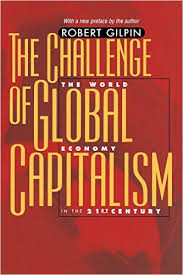A Look Ahead – Several Years Back
 Robert Gilpin wrote The Challenge of Global Capitalism: The World Economy in the 21st Century in 2000. Gilpin was widely recognized as one of the wise men of global economics and the book won notice and awards. If you were to take a college class on global trade or economics, chances were good that you would be assigned this book or one of his earlier efforts. In 2002, Gilpin penned a new preface to the paperback edition, commenting on the 2001 technology slowdown. He wrote that “this situation of Americans living beyond their means cannot last.” He explained his concerns that slowing economic growth, an American trade deficit, and high unemployment might “trigger a protectionist reaction in the United States, and that such a development would seriously damage the global economy.”
Robert Gilpin wrote The Challenge of Global Capitalism: The World Economy in the 21st Century in 2000. Gilpin was widely recognized as one of the wise men of global economics and the book won notice and awards. If you were to take a college class on global trade or economics, chances were good that you would be assigned this book or one of his earlier efforts. In 2002, Gilpin penned a new preface to the paperback edition, commenting on the 2001 technology slowdown. He wrote that “this situation of Americans living beyond their means cannot last.” He explained his concerns that slowing economic growth, an American trade deficit, and high unemployment might “trigger a protectionist reaction in the United States, and that such a development would seriously damage the global economy.”
After reading that preface, I decided that giving time to Gilpin’s prophetic work would be well worth the effort. I was correct. We are seeing signs of a protectionist backlash today. Gilpin’s analysis – particularly of the interplay of global politics and global trade – seems spot on. The heart of Gilpin’s argument is that a healthy international economy based on free markets is highly dependent upon safe and solid political leadership. It needs cooperation, stable currencies, and the recognition that multilaterism is better for all concerned. Gilpin stresses further that there should be an ongoing campaign to educate the public on the benefits of free trade and a global economy. Without leadership and popular support, the global economy is surprisingly fragile.
Gilpin highlights America’s drift toward unilateralism and the poor recognition among leaders and the public of the benefits of the global economic system. Noting the rise of international trade, technology, and services to the global economy, he makes clear that these shifts are painful. Markets are amoral, he stresses, and their impacts have to be managed. Contrasting the Cold War economy from after the fall of the Berlin Wall, Gilpin examines the structural weaknesses in the global economy: insecure trading, unstable monetary systems, and unreliable financial markets. He notes the clustering of regional economics. He also gives attention to the many critics of the global economy. They fear exploitation, loss of sovereignty, lower wages, and diffusion of culture. The answer, Gilpin writes, is better leadership and cooperation from America. He is well aware, though, that this is no easy task – and a specter of fatalism haunts Gilpin’s conclusion.
In a culture awash with bad information and fake news, I do not anticipate much interest in attempting to educate and convince the public on macroeconomic principles or facts. Nevertheless, we have to try. We need a better informed polity to navigate through these challenges. Reading Robert Gilpin is one small step in that effort.
David Potash